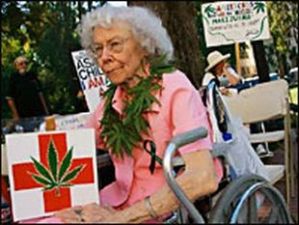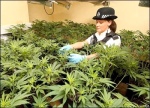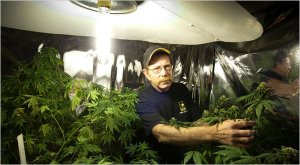Despite the amount of illegal firearms and genuinely harmful drugs that America seems to be knee-deep in, police in Oregon are concerned that card-holding medicinal marijuana users might be legally carrying guns.
Under the U. S. Gun Control Act of 1968, guns may not be sold to drug addicts. Most people would agree that this is a good idea, as the mental image of a ‘drug addict’ is almost always negative: shaking, dirty, paranoid, and incapable of rational thought. Nobody wants to arm that person.
-

An elderly medicinal marijuana user in Oregon (image courtesy of NORML)
Concealed Handgun Permits are refused
The sheriffs of Oregon, however, are classing medicinal cannabis users as drug addicts and refusing to issue concealed handgun permits to them. The sheriff’s office, by state law, should not refuse to grant such a license provided a list of conditions is met. These conditions usually include U.S. citizenship, completing a gun safety course, no criminal record, no mental illness or substance abuse problems. Again, these are all reasonable requirements, but the medicinal cannabis patients who fulfill them are still being refused the permit.
Use of prescribed marijuana should not limit a person’s rights
Retired school bus driver Cynthia Willis is one such patient, and along with three co-plaintiffs she is part of a potentially landmark case currently under consideration by the Oregon Supreme Court. Cynthia likes to carry a Walther P-22 automatic pistol, which she says she’s never had to draw, for self-defense. She also uses cannabis to control muscle spasms and pain from her arthritis, but says she never uses it when she plans to carry her gun (or drive). So far she’s won two court cases on the argument that prescribed drug use does not disqualify a person from holding a concealed gun permit, and medicinal cannabis is a prescribed drug like any other.

An outdoor medicinal marijuana crop in America
More at stake than the right to carry a concealed firearm
What is at stake here is not just the right of medicinal cannabis users to carry (concealed) firearms: by Oregon law, if someone doesn’t have a concealed gun permit but does have a gun license, they can simply carry the gun openly, as Cynthia plans to do if she loses her case. Given the tragic events in Alphen aan den Rijn on Saturday as the latest in a long line of horrific shootings by licensed gun owners throughout the world, it can be argued that gun licenses should be revoked altogether.
How do you abuse your own medicinal cannabis crop?
The underlying issue of concern in Oregon is the classification of medical marijuana patients as ‘drug addicts’, with all the negative connotations of this epithet. Although cannabis seeds have never been illegal in Oregon, and it was the first state to decriminalize possession of small amounts of bud back in 1973, courts recently decided that employers had the right to fire medicinal cannabis users. The sheriffs of this county openly argue that the majority of medicinal card holders are abusing the right to use ganja as a medicine, despite the fact that buying, selling, and dispensaries are still prohibited so patients must grow their own (or have someone grow it for them without profit) in order to do so.

NORML is active in Oregon, which was the first state to decriminalize possession of small amounts of cannabis.
Defending the rights of medical marijuana users
Executive Director of NORML Allen St. Pierre is focused on defending the right of every medicinal marijuana card holder to be treated like any other citizen: “A person who uses medical cannabis should not have to give up their fundamental rights as enumerated by the Constitution,”‘ St. Pierre said.
Source material for this article here .

 In 1967, because of my concern about the rapidly growing use of the dangerous drug marijuana, I began my studies of the scientific and medical literature with the goal of providing a reasonably objective summary of the data which underlay its prohibition. Much to my surprise, I found no credible scientific basis for the justification of the prohibition. The assertion that it is a very toxic drug is based on old and new myths. In fact, one of the many exceptional features of this drug is its remarkably limited toxicity. Compared to aspirin, which people are free to purchase and use without the advice or prescription of a physician, cannabis is much safer: there are well over 1000 deaths annually from aspirin in this country alone, whereas there has never been a death anywhere from marijuana. In fact, when cannabis regains its place in the US Pharmacopeia, a status it lost after the passage of the Marijuana Tax Act of 1937, it will be seen as one of the safest drugs in that compendium. Moreover, it will eventually be hailed as a “wonder drug” just as penicillin was in the 1940s. Penicillin achieved this reputation because it was remarkably non-toxic, it was, once it was produced on an economy of scale, quite inexpensive, and it was effective in the treatment of a variety of infectious diseases. Similarly, cannabis is exceptionally safe, and once freed of the prohibition tariff, will be significantly less expensive than the conventional drugs it replaces while its already impressive medical versatility continues to expand.
In 1967, because of my concern about the rapidly growing use of the dangerous drug marijuana, I began my studies of the scientific and medical literature with the goal of providing a reasonably objective summary of the data which underlay its prohibition. Much to my surprise, I found no credible scientific basis for the justification of the prohibition. The assertion that it is a very toxic drug is based on old and new myths. In fact, one of the many exceptional features of this drug is its remarkably limited toxicity. Compared to aspirin, which people are free to purchase and use without the advice or prescription of a physician, cannabis is much safer: there are well over 1000 deaths annually from aspirin in this country alone, whereas there has never been a death anywhere from marijuana. In fact, when cannabis regains its place in the US Pharmacopeia, a status it lost after the passage of the Marijuana Tax Act of 1937, it will be seen as one of the safest drugs in that compendium. Moreover, it will eventually be hailed as a “wonder drug” just as penicillin was in the 1940s. Penicillin achieved this reputation because it was remarkably non-toxic, it was, once it was produced on an economy of scale, quite inexpensive, and it was effective in the treatment of a variety of infectious diseases. Similarly, cannabis is exceptionally safe, and once freed of the prohibition tariff, will be significantly less expensive than the conventional drugs it replaces while its already impressive medical versatility continues to expand.
















You must be logged in to post a comment.